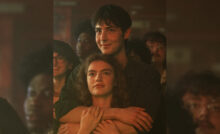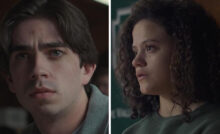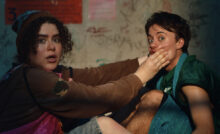Exclusive Interview: Derek Magyar Talks ‘Boy Culture: Generation X,’ Revisiting this Cult Classic, and His Multifaceted Career


Derek Magyar, recognized for his award-winning storytelling, is renowned for breathing life into impactful narratives and characters, notably in projects such as Boy Culture, Flying Lessons, and Phantom.
Recently, he reprised his role as X in Boy Culture: Generation X. X, a hard-working male companion, encounters the challenges of a market dominated by a new generation with a competitive edge. Juggling the demands of maintaining his physique and satisfying clients, X finds himself in a situation where his ex-boyfriend and current roommate, Andrew, is actively seeking to move forward.
Pop Culturalist was lucky enough to speak with Derek about his multifaceted career, stepping back into his role as X in Boy Culture: Generation X, his short film, and more.
PC: How did you discover your passion for storytelling?
Derek: I started acting when I was really young. I went to a liberal arts elementary school in L.A. called Crossroads, which has a reputation for being very focused on the liberal arts. Up the street from where I was going to school was this famous local theater company called the Santa Monica Playhouse.
That’s where I first started acting and gained exposure to plays and being creative. I was around eight years old. I had a blast doing it. It was an after-school activity, and I had a great group of classmates around me who are quite successful today that I got to have fun with and put on cool plays with. It started there and I’ve never looked back.
PC: Who or what has had the biggest influence on your career?
Derek: It’s hard to pinpoint one person, but I would probably say my mother who passed away in February as well as my wife who has a lot of input on the creative choices and the way that I do things today, more so as a director but also as an actor. And also my father. My father’s a filmmaker. We didn’t spend a lot of time together when I was a kid, but we spent a lot of time together as I’ve become an adult. He’s been telling stories as a director since he was in his twenties. Even though we didn’t spend a lot of time together, it was fascinating how similar we are in terms of storytelling. So I would say those three people have had a lot of input, and I also just had a baby. She’s going to have a lot of input into what my lens is as I continue forward with directing, acting, producing, writing, and all of those sorts of things.
PC: In addition to acting, you’re also a writer, producer, and director. How have your experiences behind the camera impacted the way that you approached your work on screen and vice versa?
Derek: There’s a level of respect and understanding that is beneficial. Being an actor who understands directing, you have an understanding for what it means to hit your mark, where the camera is going to be, and what kind of freedom you have within the structure of blocking for a scene and vice versa.
As far as directing, there is this understanding of what can help an actor through a challenging moment in a scene, through an entire film, or television series. There’s a real understanding on a very basic human level that I’m able to support my actors in a way that they feel they have a lot of freedom to make choices and mistakes.
This isn’t a dictatorship; it’s a collaboration. It’s about coming up with the most interesting choices, which usually happens through mistakes or things that are not planned. Those are the most interesting takes and the most interesting scenes and moments. It’s been really helpful going back to graduate school and studying directing as well as learning by doing.
PC: You’re reprising your role in Boy Culture: Generation X. What was it like for you stepping back into a role that you played almost a decade ago? What were you most excited to further explore?
Derek: It was everything. That team is such a great group of people. They’re like family to me. We’ve been through a lot together with the feature and its festival run. We really got to explore what that film was and the journey of making it and afterward.
With the television series, it was getting the chance to work with Q. Allan Brocka again and working with Darryl [Stephens], with whom I have a really special friendship. And also Matthew [Rettenmund], who got involved as a writer on the series. In the film, he was more guiding it, and Q. Allan and Philip [Pierce] (one of the producers) wrote the feature, whereas Matthew wrote the book and Q. Allan wrote the series, bringing an extra level of excitement to it for me as well.
PC: The original film was such a cult classic. Do you remember what initially attracted you to this project? Why do you think this story lends itself to a television series now?
Derek: The script was extremely interesting and strong. I thought the characters were really well-written and rich. Any actor looking to challenge themselves and play a character who is flawed and interesting would relish the opportunity. I was lucky that I was cast. That was an incredible experience.
In terms of why it lends itself to a television series ten years later, I think it’s the way that society and culture have evolved, especially in the LGBTQ+ community. It has a lot of relevant themes and topics that are very real.
The show approaches it in a way that’s based in reality but also brings a bit of satire to it, which I think isn’t going to be for everybody, but in a lot of ways, it makes it unique and interesting in terms of the type of storytelling.
Q. Allan has a unique way that he likes to approach storytelling. Some things that may be considered tropes, he’s able to poke at them in a way that makes them interesting and relevant.
Having X be this character who has to go back into hustling ten years later is really interesting because so much has changed in the world. He was referral-only and was paid a ton of money; now everything is digital. Everything is done on social media. Everything is done the opposite way that X is used to doing things. Now, he’s one of many, whereas before he was one of few. That’s a really interesting thing to examine. That brought a lot of interesting energy to it.
PC: There’s also a lot of vulnerability that you have to tap into for this character and his arc in the series. How did you create the space for yourself to dive into that emotionally?
Derek: The character is so rich in the writing. I was able to sink back into it in a really natural and organic way. I didn’t have to put that much extra work in. I did some research into certain pieces of the story that I thought were important that I needed a deeper understanding of, but for the most part, I was able to just drop into the character and find him ten years later, and bring myself and my own vulnerabilities into the way that I portrayed him.
PC: On the writing and directing fronts, you have a short film that’s making its way around the festival circuit. Is there anything you can tease about that project?
Derek: Yeah, we’re actively working on it. It serves as an interesting short as well as a glimpse into what is going to be a feature. We’re working on it as I speak to you on the feature as a development project for 2024. We’re just at the finishing phases of the script. We’re close to having the feature written, which is amazing and exciting. The hope is to start shooting sometime in the fall of next year.
To keep up with Derek, follow him on Twitter and Instagram. Watch Boy Culture: Generation X on AppleTV+ today.
Photo Credit: David Zaugh
Recent Posts
SXSW 2025: Florence Hunt and Rory Walton-Smith on ‘Mix Tape,’ First Love, and Their Artistic Process
First love is unforgettable. It leaves an imprint, shaping the way we see the world,…
SXSW 2025: Why ‘F*ckUps Anonymous’ Is More Than Just a Show—Joe Tierney, Katrina Whalen, Sarah Jeffery & Andrew Michael Fama on Giving a Voice to the Voiceless and the Power of Storytelling
Television has the power to do more than entertain—it can challenge, heal, and transform. Some…
SXSW 2025: Siobhan McCarthy, Misha Osherovich, and Nico Carney on Reclaiming Comedy Classics with Trans Inclusion in ‘She’s the He’
Comedy classics like Mean Girls, She’s the Man, and Clueless have shaped generations with their…
Daring, Unpredictable, and Unforgettable: Tyler Cornack’s ‘Mermaid’ Dives into SXSW 2025 with Stars Johnny Pemberton and Avery Potemri
To say Tyler Cornack is a visionary would be an understatement. His fearless approach to…
SXSW 2025: Daisy Friedman and Arielle Friedman on ‘Unholy,’ Authentic Representation, and Capturing the Pressures of Family, Tradition, and Identity
There’s nothing more powerful than a filmmaker reclaiming their own story, but true brilliance comes…
Inside ‘Sweetness’: How Writer-Director Emma Higgins and Her Cast Built One of SXSW’s Most Unforgettable Films
Sweetness isn’t just a film—it’s a layered, unsettling portrait of fame, grief, fixation, and the…


